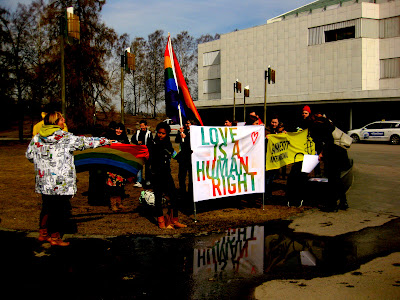Osallistun
Euroopan neuvoston nuoriso-osaston vihapuheen vastaiseen kampanjaan, No Hate Speech Movementiin. Kampanja avataan virallisesti tämän viikon perjantaina,
mutta kampanjan bloggaajien koulutus on jo alkanut. Tämän viikon tehtävänä oli
kirjoittaa ihmisoikeuksista ja mikäpä sen parempi aihe kuin oikeus
avioliittoon. Edellisessä postauksessa kirjoitin samasta aiheesta suomeksi.
Koska kampanja on Euroopan laajuinen, kirjoitan siihen liittyen
myös englanniksi. Kielitaitoni saattaa olla hieman ruosteessa, mutta ehkä
tärkeämpää on se mitä sanoo kuin se, miten hyvin osaa valita oikeat
prepositiot.
I’m participating in the No
Hate Speech Movement by Council of Europe’s Youth Department. The campaign will
be launched this Friday but our training has already begun. This weeks assignment
was to write about human rights. The right to marriage seemed a good theme for
the post.
Love is a human right
I dare to say that the human
right situation is relatively good in Finland. We are well off compared to many
other countries. Still, it doesn’t mean that there are no breaches or
violations of human rights. It doesn’t mean that our country is ready.
Today is a flag day in
Finland. We are celebrating equality and flagging to the credit of Minna Canth,
Finnish writer, feminist - and the only Finnish woman having a flag day
dedicated to her.
Today we also witnessed a
concrete and beautiful act of equality: the citizens’ initiative for
gender-neutral marriage was opened for signatures and in 14,5 hours it was
signed by the required 50 000 citizens. Collecting of the signatories will
continue the next six months and in September the initiative will be handed
over to the parliament.
At the end of February
parliament’s Legal Affairs Committee decided by a narrow vote not to table the
initiative for discussion and balloting. The accumulation of the required
support means that lawmakers must now consider the bill.
In Finland homosexuality was
illegal up until 1971. From March 1st 2002 same-sex couples have had
the right to legally register their relationship. The civil union gives the
couples same obligations as marriage but not the same rights. The same-sex
couples can inherit each other but they don’t have the right to take the same
surname or to adopt outside the family, for example. Finland remains the only
Nordic country that does not recognize same-sex unions.
The 16th article
of the Universal Declaration of Human Rights states that “Men and women of full
age, without any limitation due to race, nationality or religion, have the
right to marry and found a family. They are entitled to equal rights as to
marriage, during marriage and at its dissolution.” Although it speaks about “men
and women” it also says “without any limitations”. In my world sexual
orientation mustn’t be a limitation on the right to marriage and found a family
- on the right to love.
The European Convention for
the Protection of Human Rights and Fundamental Freedoms goes a bit further. Its
12th article states that “Men and women of marriageable age have the
right to marry and to found a family, according
to the national laws governing the exercise of this right.” Our national
law doesn’t give the same opportunities to everybody in this particular (not
only) case - yet. But laws are only social constructions made by human beings
and can be changed.
Some of my brethren are
homosexuals. There are homosexuals among my family members, friends,
acquaintances and neighbours. Also at my office, in my football team, in my
political party and in my university. And I think it’s totally wrong and gives
me unfathomable sorrow that they are discriminated just because of falling in love
with a person, not gender.
It’s inconceivable that so many people have to fight for their right to
love on a daily basis. To ponder on what to tell other people about their
families. To dread even, narrow-mindedness and hatred welling of some irrational
fear. To register instead of marrying.
In this assignment I was asked to reflect on and write what human rights
mean to me. Whether they are important for me or not. I guess no one would say that
human rights are not important. Still we seem to have different opinions on
what human rights are, what they mean and who they concern.
I think they concern every single human being. After all, they’re called human rights. Not heterosexuals’ rights
or Europeans’ rights or some people’s rights but human rights. They are
everybody’s business. We are all entitled and obliged to fight for equality and
equal rights. The more we are the louder the voice.


